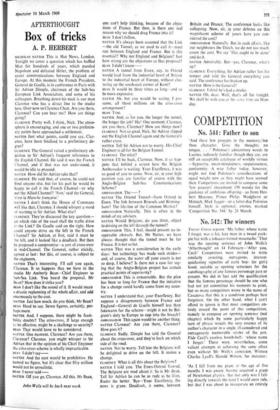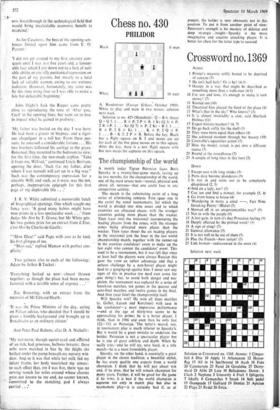No. 542: The winners
.Trevor Grove reports: 'My father, whose name I forget, was a fat, lazy man in a tweed pork- pie hat with a tobacco-stained moustache.' That was the opening sentence of John Wells's 'Afterthought' on 14 February—'After you, Cecil.' Competitors were invited to write similarly arresting, outrageous, interest- quickening vignettes of early boy- (or girl-) hood, suitable as opening sentences for the autobiography of any famous personage past or present. We did in fact add the qualification that the famous personage should be one who had not yet committed his memoirs to print, but so many competitors wrote in the name of Casanova that this is a condition perhaps best forgotten. On the other hand, what I can't afford to ignore is that most competitors en- tirely missed the point of this competition, namely to compose an opening sentence (not chapter) which by some particularly happy turn of phrase reveals the very essence of its author's character in a single, ill-considered and outrageously memorable stroke of the pen. Vide Cecil's careless bombshell : 'whose name I forget.' There were, nevertheless, some valiant attempts at achieving the same effect even without Mr Wells's concision. Witness Charles Lyall's Harold Wilson, for instance:
'As I fell from my pram at the age of five months I was aware, having acquired a grasp of Newtonian physics. that not only was I fall- ing directly towards the land I would once rule, r but that I was about to inaugurate an entirely
new breakthrough in the technological field that would bring incalculable economic benefit to mankind.'
As for Casanova, the best of the opening sen- tences foisted upon him came from E. 0. Parrott: 'I did not get around to my first amatory con- quest until I was just five years old, a lament- able fact which I put down not to a lack of suit- able ability or any silly puritanical repression on the part of my parents, but merely to a total lack of suitable women, owing to our extreme isolation. However, fortunately, my sister was by this time rising four so I was able to make a late but delectable beginning.'
John Digby's Jack the Ripper came pretty close to reproducing the tone of 'After you, Cecil' in his opening lines, but went on to lose in impact what he gained in prolixity:
'My father was buried on the day I was born. He had been a grocer in Stepney, and a rigor- ous chapelgoer in a tall hat. From these pur- suits. he amassed a considerable fortune ... His two brothers followed his cortege to. the grave. Returned, they mounted to the bedroom to view, for the first time, the new-made orphan. "Take it from me, Wilfred," continued Uncle Bertram, opening the door, "Jack (i.e. my father, after whom I was named) will cut up in a big way." Such was the contemporary expression for a sizeable Will; and such, as it were, was the not, perhaps, inappropriate epigraph for this first page of my deplorable life . .
J. R. V. White submitted a memorable batch of biographical openings. One which caught my fancy was: 'A good many babies might have won prizes in a less spectacular week ...' from Judge Me Not by T. Grove, but Mr White gets his two guinea prize for an extract from L'Etat, c'est Moi by Charles de Gaulle :
'"Mon Dieu!" said Papa with awe as he took his first glimpse of me.
"Mais oui," replied Maman with perfect sim- plicity.'
Two guineas also to each of the following: Adam by Jethro B Tucket: 'Everything looked so new—almost thrown together; as though the place had been manu- factured with a terrible sense of urgency ...'
Zoe Browning, with an extract from the memoirs of Mr Edward Heath: 'It was the Prime Minister of the day, acting on Palace advice, who decided that I should be given a humble background and brought up in Broadstairs as an ordinary citizen.'
And Peter Paul Rubens, alias D. A. Nicholls: 'My wet-nurse, though squint-eyed and afflicted of an itch, had generous, bulbous breasts: these orbs were matched in hue by the thighs she bathed under the pump beneath my nursery win- dow. And so it was that while her milk fed my infant frame, her body nourished my senses: to such effect that, ere I was five, there syas no serving wench for miles around .whose charms were not known to me and, no sooner known, committed to the sketching pad I always carried . •



































 Previous page
Previous page